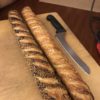Nigel Slater is the UK’s favorite food writer – and in books like his latest, “Notes from the Larder: A Kitchen Diary with Recipes,” he focuses on the home-grown, home-made, and generally friendly side of cuisine. He makes his essays on simple moments from the kitchen interesting with his distinctive, evocative writing style and sharing intimate moments from his real life in and out out the kitchen.

Nigel Slater: An important point is I am not a chef. I am very much a home cook. A lot of very beautiful, very wonderful cookbooks – I am not sure they are always used. And the joy of writing as I do is that I know these recipes are cooked in people’s kitchens day after day. I know that because I get great feedback.
Rico Gagliano: I am nodding my head because it is so true. There is such a huge market now for cookbooks, but there are these huge coffee-table books and I almost never see people using them. They are more really for looking at the pictures.
Nigel Slater: I do think it is a place for all sorts of books. I love dreaming about food that chefs do. Do I cook like that in my kitchen? No, I don’t.
Rico Gagliano: Let’s talk about this cookbook. It is no surprise given the title: It is a book of food-related notes from your diaries — meals you ate, recipes you created and little essays about kitchen implements.
I think a lot of food writers would love to be in the position that their notes could become a book that people would actually buy. But does that change the way you write in your diaries? Knowing that millions of people may read it?

Nigel Slater: It probably does, but I don’t think about that. I do know other people are going to make these recipes, so I have to make absolutely certain that I get the order I did a recipe in correct. That I get things like weights and measures right. My handful might be different then someone else handful.
Rico Gagliano: You should include an implement that is a perfect your handful measure.
Nigel Slater: I think it is called a cup. But the thing is about the way I do the recipes and the way that I cook, the recipes are not so finely honed that it actually matters that much if you have a teaspoon or a tablespoon more. This is home cooking; it is friendly home cooking it doesn’t need to be that specific.
Rico Gagliano: Previously, you published a book called “Tender,” which is the story of your vegetable garden, the food that grows in it.
This new book is about small personal things. How do you talk about pans and make them of interest to the rest of us?
Nigel Slater:
There is a little bit of honesty in my book. Things don’t always work, and I have never pretended that they do.Maybe it is that. I am telling people a little bit about my life and other writers might not. I am telling a little about what is going on in my kitchen and what goes on during my day.
Rico Gagliano: I would like you read a passage — the short entry under Oct. 16.
Nigel Slater: Raking the leaves up from the garden paths it is a nip in the air and a definite carb moment . Supper is baked potatoes saw crusted by rolling the damp fresh potatoes in sea salt flakes baked till there skins are crisp then split open and stuffed with smashed mackerel and chopped dill. A dollop of sour cream and it’s a quietly splendid evening meal.
Rico Gagliano: It is such an evocative passage but very understated, and you say also there had to be a place for your BBC TV show Simple Suppers, which has “calm gentle presentation,” as opposed to typical celebrity chef shows. Is this all a reaction to too much noise in the food world?
Nigel Slater: Well, there is a lot of noise out there. It is very easy to get carried away with the whole TV celebrity cook thing. It is something I am very uncomfortable with.
Rico Gagliano: Why is that?
Nigel Slater: It just doesn’t feel right.
I have a certain way that I live and I work that is probably quite unprofessional, it’s amateurish and a bit bumbly, but that is how I want to be.I do see people out there become businesses and good luck to them. That’s fine, but it is not for me.
Rico Gagliano: There is a saying that food is the new rock. People say you are the yacht rock of food. The entry under Oct. 8, you wax surprisingly poetic about a baking pan.
Nigel Slater: It is very easy for me when I cook with an implement to be slightly romantic about it slightly attached. If I cooked something in a pot and I put that pot on the table and everyone is tucked in and had a good time, I associate that pot with everybody having a great time. That is how I think of them. I hate to lose things.

Rico Gagliano: Do you, then, have gigantic cupboards full of pots you only rarely use because you can’t throw them out?
Nigel Slater: I probably have less equipment than anybody I know who does a lot of cooking. And I am not fond of gadgets — those little bits and pieces that really only have one use, and you only use them once a year.
Long ago, I took the gadget drawer and tipped it upside down over the bin and everything went. They’re gone. I don’t need any of them.
Rico Gagliano: Did you ever regret getting rid of any of them?
Nigel Slater: Yes, the olive oil pourer. That’s the only thing I miss.
Rico Gagliano: What’s your favorite kitchen implement? What is the one thing you couldn’t do without?
Nigel Slater: I picked up a little spatula. You can use it for getting fish out of a pan so it does not break, and you can use it for getting cookies off a baking sheet. You can use it for cutting things up. It is a little brass spatula that I got in Japan and it feels right in my hand and they are very difficult to find. I will have to probably go back to Japan to get another one. But it works for me. If I didn’t have it in my kitchen, I would feel so lost.
Rico Gagliano: I can’t let you go without mentioning my favorite scene in “Toast.” This is where your father, back in the days when Italian cooking was a new thing in Britain, brings home Parmesan cheese for the first time. Do you remember this passage? Tell us what happened next?
Nigel Slater: Oh of course, I remember that day. I can’t think of anyone else who’d had spaghetti with Parmesan cheese. Not even my friends had. And this was the very early ’60s. My father brought it home and I thought, We are going to really eat foreign food, this is very exciting!
He’d bought Parmesan cheese already grated in a little drum and he sprinkled over the spaghetti, and it isn’t the best smell in the world, to be honest. It isn’t like freshly grated Parmesan. And he took one sniff and he said, “This smells like vomit. I am sorry; we cannot eat this.” And we never had it again.
Rico Gagliano: It is such an indicator of the time. Your tastes, and the tastes of the U.K., and the U.S. have come so far since then. If you had to name the main reason why, what would you say?
Nigel Slater: It is tempting to say travel, but I think the real reason is confidence. The fact that there are so many helpful writers, cooks on television, cooks in school letting people know you can do it. It is really easy.
Once you have confidence, you feel you can do anything. You can try different cuisines. It really is about that little bit of confidence that we’re all getting, one way or another.


